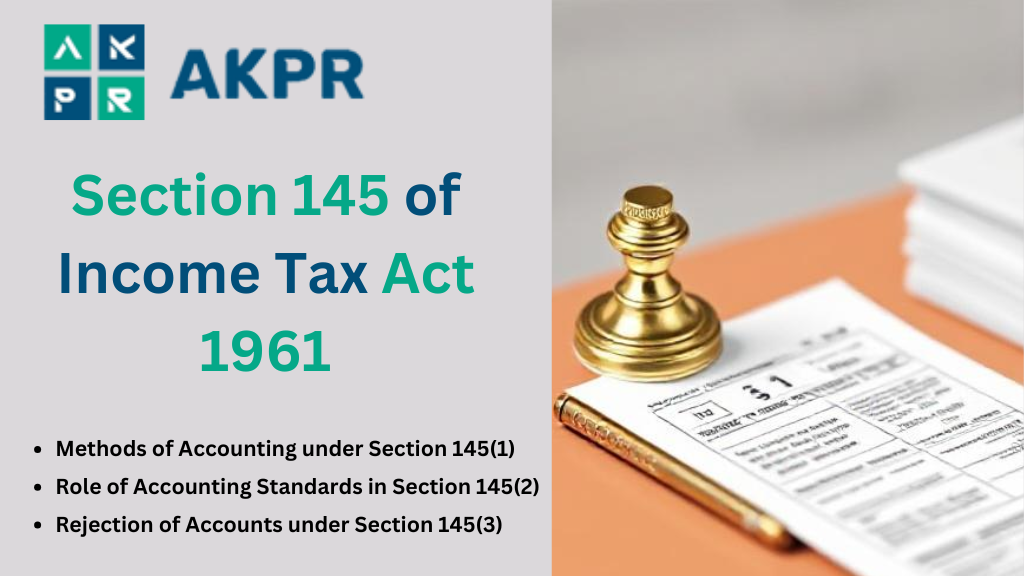The Role of Section 145 of Income Tax Act 1961
Ever questioned how businesses and professionals are required to keep their books of account for tax purposes? The Income Tax Act of India provides a structured method under Section 145 of the Income Tax Act 1961 to ensure transparency and consistency in accounting methods.
In this article, we’ll look at Section 145 of the Income Tax Act, its sections, and how they affect taxpayers. Whether you’re a company owner, an accountant, or just interested in taxation, this article will help you learn it in simple words.

What is Section 145 of Income Tax Act 1961?
Section 145 defines how businesses in India must compute income taxes based on their accounting method. It requires that taxable income under ‘Profits and Gains of Business or Profession’ and ‘Income from Other Sources’ be calculated using either the cash or mercantile accounting system.
Key Provisions of Section 145
- Method of Accounting: Section 145(1) mandates that income should be computed using either the mercantile system or the cash system of accounting.
- Power of the Assessing Officer: Under Section 145(3), the Assessing Officer (AO) has the authority to reject the accounts if they are not maintained according to the prescribed standards.
- Accounting Standards: The Central Government has the power to notify Income Computation and Disclosure Standards (ICDS) to ensure uniformity in the computation of taxable income.
Permissible Methods of Accounting under Section 145(1)
The Income Tax Act allows taxpayers to choose between two methods of accounting:
1. Mercantile System of Accounting
- Under this method, income and expenses are recorded when they are accrued, regardless of whether the cash transaction has taken place.
- It is the most commonly used method by businesses and professionals as it provides a more accurate representation of financial transactions.
- Example: If a company sells goods in March 2024 but receives payment in June 2024, the income is recorded in March itself.
2. Cash System of Accounting
- In this method, income and expenses are recorded only when they are received or paid.
- This method is generally used by professionals such as doctors, lawyers, and consultants.
- Example: If a consultant renders services in March 2024 but receives payment in June 2024, the income is recorded in June.
Role of Accounting Standards in Section 145(2)
The Central Government has the authority to notify accounting standards that taxpayers must follow while maintaining their books of accounts. These standards, known as Income Computation and Disclosure Standards (ICDS), ensure uniformity and consistency in computing taxable income.
Some of the important ICDS notified under Section 145(2) include:
- ICDS I: Accounting Policies
- ICDS II: Valuation of Inventories
- ICDS III: Construction Contracts
- ICDS IV: Revenue Recognition
- ICDS V: Tangible Fixed Assets
- ICDS VI: Effects of Changes in Foreign Exchange Rates
Rejection of Accounts under Section 145(3)
The Assessing Officer (AO) has the power to reject the books of accounts if:
- The taxpayer does not follow the prescribed accounting standards.
- The books of accounts are not properly maintained.
- The income computation is not correct or misleading.
If the AO rejects the accounts, income can be assessed based on best judgment assessment under Section 144.
Need Expert Help? Reach Out to AKPR Today!
Dealing with Section 145 of the Income Tax Act can be complex, especially when it comes to choosing the right accounting method for your business. Whether you’re struggling with cash accounting or the mercantile system, ensuring compliance with tax regulations is crucial.
At AKPR, a professional CA firm, we specialize in income tax advisory and provide expert guidance on how Section 145 impacts your financial statements, tax liabilities, and business operations. Our team of seasoned professionals helps you navigate accounting standards and ensures that your books align with legal requirements.
Our services include:
✅ Tax Compliance: GST, Income Tax, TDS
✅ Labor Law Compliance: PF, ESI, Minimum Wages
✅ Corporate Governance: Filing Annual Returns, Legal Documentation
✅ Statutory Compliance Audits & More
If you need clarity, compliance, or strategic tax planning, don’t wait! Get in touch with AKPR today and let us handle your tax concerns with precision and expertise.
📞 Call us now or visit our website to schedule a consultation!
Looking for CA Firm in India?
CA Firm in Mumbai | CA Firm in Parel | CA Firm in Andheri | CA Firm in Bandra | CA Firm in Nariman Point | CA Firm in Ghatkopar | CA Firm in Dadar | CA Firm in Bandra Kurla Complex | CA Firm in Juhu | CA Firm in Jogeshwari | CA Firm in Goregaon | CA Firm in Borivali | CA Firm in Thane
FAQs
What is the main purpose of Section 145 of the Income Tax Act?
It provides accounting procedures to promote consistency and transparency in income tax calculation.
Are all businesses required to follow notified accounting standards?
Yes, businesses must comply with set requirements under Section 145(2) of the Income Tax Act 1961.
Pingback: What Services Provide an Income Tax Consultant in India? | AKPR